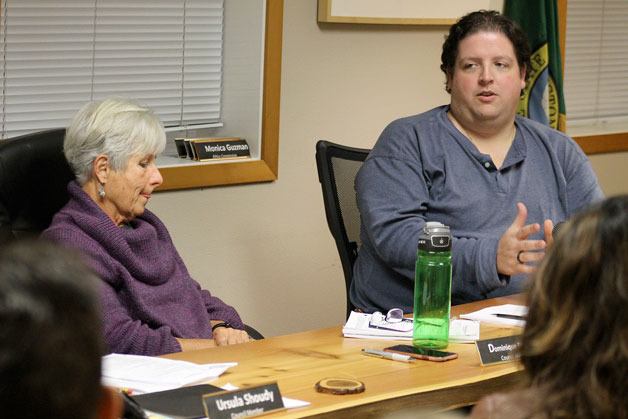In an effort to prevent drug and vagrant activity as well as vandalism at Seawall Park, the Langley City Council gave a preliminary OK to an ordinance that will close the park from 12 a.m. to 6 a.m.
The 4-1 decision came on the heels of two public discussions regarding heroin syringes found at Seawall Park and illegal activity happening on private property. Police Chief David Marks recommended the city council close parks in Langley at a Sept. 5 meeting after collecting 40 syringes in two weeks at Seawall Park.
The council’s decision precedes an actual draft of the new code. A draft will be presented at the council’s next meeting on Oct. 17 for a first reading and public comment.
City Councilwoman Dominique Emerson was the lone dissenting vote against closing the park. Emerson said she was reluctant to pass an ordinance “that says we are going to enforce it selectively,” citing concerns that this will lead to police profiling.
Marks responded by saying that he and his staff help Island County with enforcing hours of operation at other parks and “we don’t care who they are.” The ordinance will allow police to approach those violating the hours of operation, whereas before police needed reasonable suspicion to approach someone.
Councilman Thomas Gill said after the meeting that he understood Emerson’s position, but that the decision was a step in the right direction. He added that he would like to see the ordinance expanded throughout the city and neighborhoods.
“I’m afraid if this works, we’re just going to move the problem into the rest of the city,” Gill said.
The decision came as a relief to residents and private property in the audience.
Bernadette Aguiar, a private property owner on First Street who has been “heavily hit” this year by illegal activity, said she feels a lot better now that police will have a chance to act on the issue. Langley residents Chava Hill and Bristol Branson were also glad a decision as made. Hill said part of being a Langley resident is preserving the community and its involvement in the city, while Branson also felt it was a small step in the right direction.
“I’m really glad the city council has decided to move forward in making a change,” Branson said.
In previous discussions, residents and private property owners had been split between those who wanted the problem gone and those who doubted the veracity of the drug activity and did not wish their freedoms of frequenting the park at night infringed upon.
Sharon Emerson, who’s been critical of the proposal, said in a phone interview Tuesday morning that the council’s decision was “irrational” because “there doesn’t appear to be a needle problem.” She and others swept Seawall Park for heroin syringes in mid-September and came up empty-handed. Emerson also expressed interest in riding along with police but said she did not hear back from city officials. She also said the ordinance will do little to nothing in stopping people from camping underneath the Dog House.
“They already know they’re doing something illegal,” Emerson said. “It doesn’t make any sense. All it does is cut off legitimate uses.”
At the meeting, Marks said drug activity has decreased considerably since he first reported the problem Sept. 5, but that it will likely come back when “it gets out of jail.”
“I don’t want to slander anybody,” Marks said. “But, I know that this is going to come back, otherwise I wouldn’t have brought it up.”
The council’s decision also went against a recommendation by the Langley Parks and Open Space Commission at a Sept. 20 meeting, which felt the council should table the issue for six months until further examination of increased patrol activity and cleanup efforts of syringes be made.
Gill thought a loitering ordinance should also be considered. If police are given the opportunity to intervene rather than observe and report, Gill said there would be more opportunities to help fix the problem.
“This is not stuff that just happens at night,” Gill said. “This is stuff that happens all day, every day. We need to have something to give Chief Marks, his officers, the sheriff’s department and state patrol coming through our town trying to keep peace in our community and give them the tools to keep the peace and not just observe things and report it later.”
Mayor Tim Callison felt the council did a good job of listening to concerns expressed by residents and property owners. He also said that the discussions brought attention to a larger problem occurring in Island County, which is considered by some as being an opioid epidemic.



